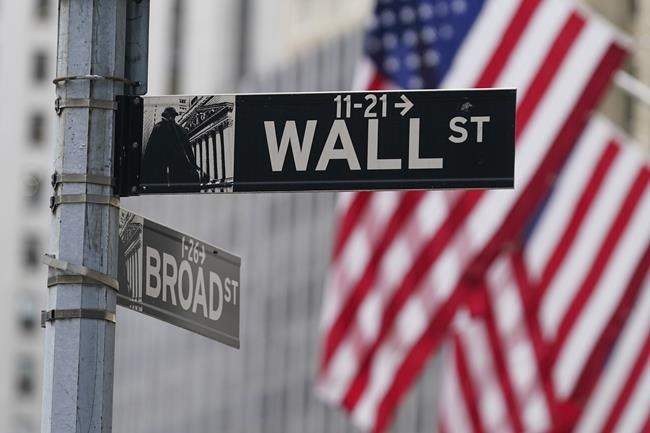NEW YORK (AP) ŌĆö Stocks are closing higher, boosted by more signs the nationŌĆÖs high inflation may be falling off faster than expected. But a flare-up of worries about the war in Ukraine kept Wall Street shaky Tuesday and undercut much of its big morning gains. The S&P 500 rose 0.9%. Earlier in the day, it saw a 1.8% gain disappear and swung briefly to a loss of 0.1%. Through the marketŌĆÖs swerves, technology stocks continued to lead Wall Street on hopes that the Federal Reserve may ease up on the pace of its interest rate hikes, which are meant to tame inflation by slowing the economy.
THIS IS A BREAKING NEWS UPDATE. APŌĆÖs earlier story follows below.
NEW YORK (AP) ŌĆö Stocks are up Tuesday, boosted by more signs the nation's high inflation may be falling off faster than expected, though a flare-up of worries about the war in Ukraine kept Wall Street shaky and undercut much of its big morning gains.
The S&P 500 was 1% higher in afternoon trading after a wild ride where it charged to an early gain of 1.8%, only to see it all disappear and briefly swing to a loss of 0.1%. The Dow Jones Industrial Average was up 75 points, or 0.2%, to 33,612 after veering from a gain of 450 to a loss of 216. The Nasdaq composite was still leading the market and 1.7% higher, as of 3:20 p.m. Eastern time.
When Wall Street opened for trading, the overall mood was ebullience as stocks bounced following the latest economic report to suggest from its summertime peak. The S&P 500 climbed to its highest level in two months, while Treasury yields eased on hopes a slowdown in inflation could mean the Federal Reserve's bitter, economy-crunching medicine for it could taper as well.
But the gains for stocks disappeared following , which is a member of NATO.
Prices for crude oil jumped as stock prices fell, an indication traders were building bets for aftershocks from an escalation in the war in Ukraine. Beyond the human toll, a worsening war could cause spikes in prices for oil, gas and other commodities that the region produces, which could worsen inflation.
Markets then recovered and retraced some of their movements as the afternoon progressed.
ŌĆ£Inflation is still top of mind and market moving,ŌĆØ said Nate Thooft, senior portfolio manager at Manulife Investment Management. ŌĆ£Anything that potentially swings the inflation story, the market is keen to react.ŌĆØ
Such steep swings for stocks have almost become the norm on Wall Street this year, as high inflation and interest-rate hikes by the Federal Reserve have heightened fears and triggered knee-jerk reactions. ŌĆ£The market remains adrift looking for a good narrative that will stick but seemingly not finding it,ŌĆØ Thooft said.
Through Tuesday's swings, technology stocks continued to lead the way on Wall Street.
They're usually some of the hardest hit when expectations are rising for interest-rate hikes from the Fed, which tend to hurt stocks seen as the most expensive or most risky. They're also among the biggest beneficiaries when the pendulum swings the other way.
Chipmaker Nvidia rose 2.8%, and Apple rose 1.6%.
Traders have been paring their bets for how big a hike the Fed will announce at its next policy meeting in December. That started when a report last week showed that inflation at the consumer level slowed more than expected in October.
On Tuesday, hopes built after a separate report showed inflation at the wholesale level eased back to 8% in October from 8.4% a month earlier. That was even better than the 8.3% economists were expecting.
ŌĆ£The improvement is simply encouraging,ŌĆØ said Mark Hackett, chief of investment research at Nationwide. ŌĆ£More importantly, what it's doing is taking universal pessimism and starting to put some holes in that theory.ŌĆØ
The Fed has already hiked its key overnight rate up to a range of 3.75% to 4% from virtually zero earlier this year. It has said it still plans to hike rates further and then to hold them at that high rate for a while in order to grind down inflation. The hope for markets is that the recent improvements in data for inflation could mean the Fed will end up holding rates at a level that doesn't punish Wall Street as much.
Rate increases can cause a recession because they slow the economy, and they also drag down prices of stocks and other investments.
Bond yields, which have been hovering near multidecade highs, eased slightly. The yield on the two-year Treasury fell to 4.36% from 4.40% late Monday. The yield on the 10-year Treasury, which influences mortgage rates, fell to 3.79% from 3.85%.
Investors will get more updates on inflation's impact on businesses and consumers this week with corporate earnings from big retailers.
Walmart surged 7.6% after reporting strong financial results, raising its profit forecast and announcing an opioid settlement.
Target reports its results on Wednesday, and Macy's reports its results on Thursday.
Wall Street will get a broader update on retail sales Wednesday when the government releases its report for October.
ŌĆöŌČ─ö-
AP Business Writers Joe McDonald and Matt Ott contributed to this report.
Damian J. Troise And Stan Choe, The Associated Press



